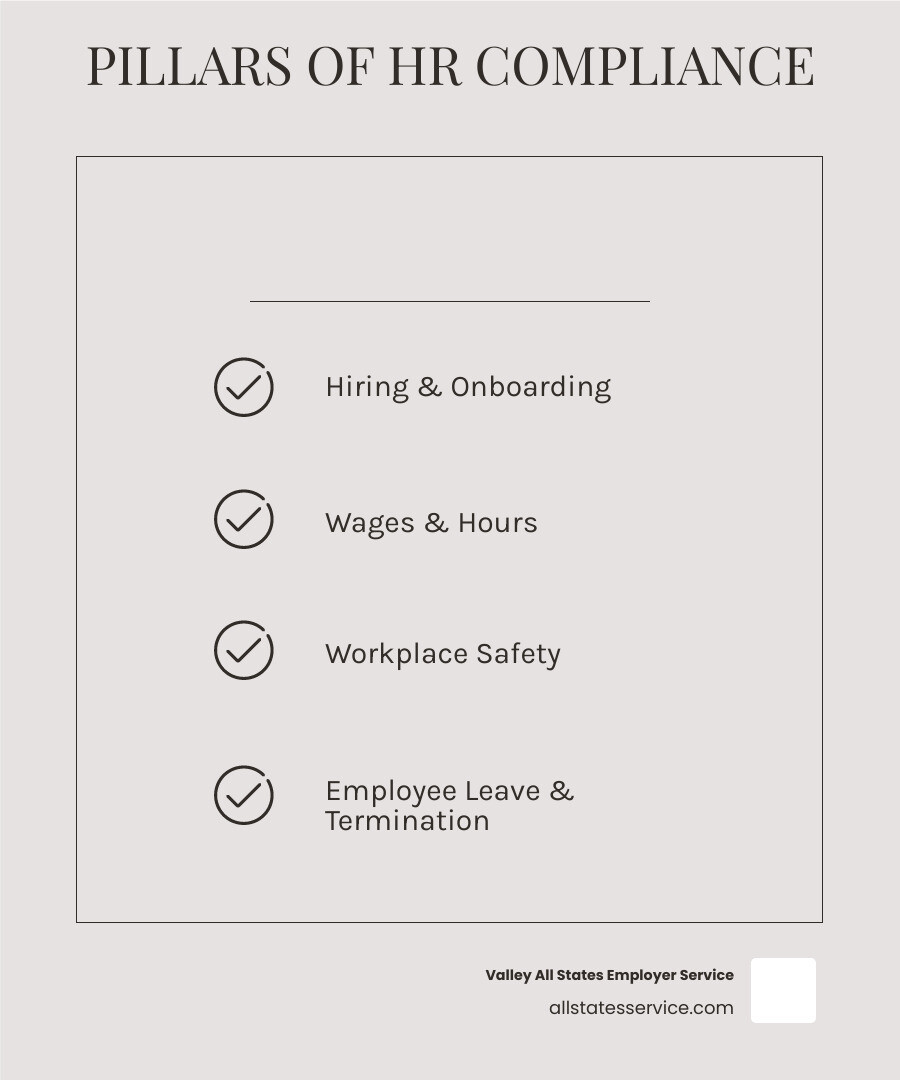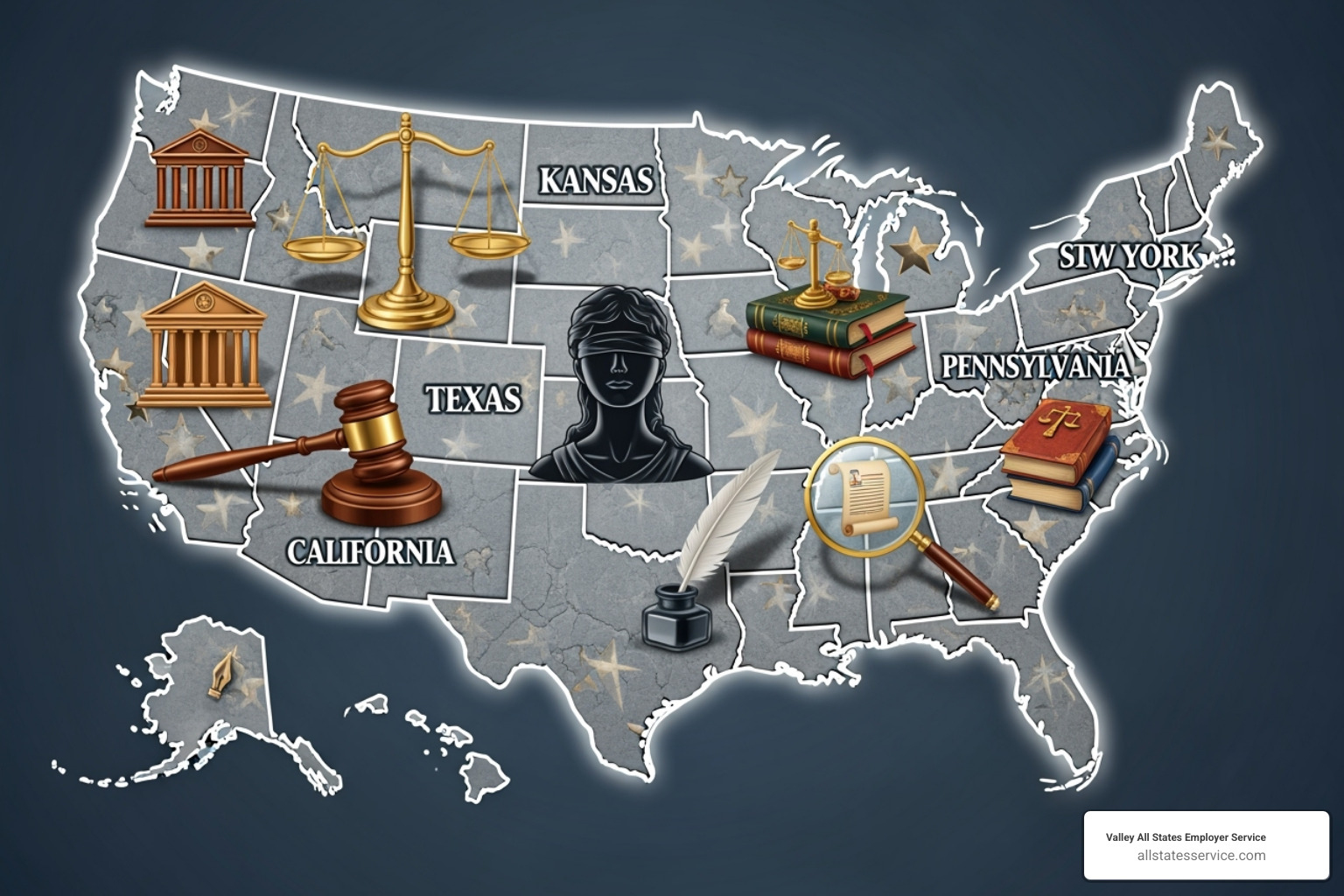Understanding HR Compliance Assistance
HR compliance assistance helps businesses steer the complex world of employment law. It provides the tools and expert support needed to:
- Stay legal: Keep up with changing federal, state, and local regulations.
- Avoid risks: Prevent costly fines, lawsuits, and penalties.
- Focus on growth: Free up time and resources from administrative burdens.
- Build trust: Create a fair and safe workplace for employees.
Navigating the maze of employment law and ever-changing regulations is a challenge for businesses of every size. Luckily, HR compliance assistance is your strategic solution for staying ahead.

Why HR Compliance is a Must for Modern Businesses
For any business, HR compliance isn’t just a legal necessity; it’s a foundational pillar for success. Think of it as the strong framework that supports your entire operation. At its core, HR compliance means gracefully navigating the intricate web of federal, state, and local employment laws. This includes everything from how you hire new team members to how you handle pay, workplace safety, and even when an employee leaves.

When you prioritize compliance, you’re doing something powerful. You’re building trust with your employees by showing you value their rights and well-being. You’re also creating a crucial shield for your business, protecting it from significant legal and financial risks. When HR compliance assistance is handled well, it frees your organization to focus on its core mission and achieve sustainable growth, rather than getting bogged down in legal worries.
These laws are constantly monitored and updated by key regulatory bodies. The U.S. Department of Labor (DOL) oversees rules about wages, hours, and worker benefits. The Equal Employment Opportunity Commission (EEOC) works to prevent discrimination and ensure fair treatment for everyone. And the Occupational Safety and Health Administration (OSHA) sets the standards for a safe and healthy workplace. Staying informed about the requirements from these bodies is absolutely essential.
Why does this all matter so much? Well, missteps in this area can be incredibly costly. Did you know that workplace lawsuits topped a staggering $3.6 billion in 2021? That’s a huge amount of money that businesses had to pay out! Non-compliance can lead to hefty fines, damaging lawsuits, and even harm your brand’s reputation.
The good news is that help is available. The DOL itself offers a wealth of official resources for employers, with clear information to help you comply with federal employment laws. Organizations like SHRM also provide valuable compliance resources to keep HR professionals updated. Investing in expert HR compliance assistance isn’t just about avoiding penalties; it’s about building a robust and resilient foundation for your business.
The High Cost of Getting It Wrong: Risks of Non-Compliance
Ignoring HR compliance is like playing with fire – the consequences can be devastating for your business. It’s not just about ticking boxes; it’s about safeguarding your company’s future. When things go wrong, the primary risks often show up as significant financial penalties and costly lawsuits. A single misstep can lead to huge fines, back pay awards, and legal fees that can seriously hurt even a successful business.
Beyond the direct financial hit, non-compliance can severely damage your brand and reputation. In today’s connected world, news of workplace violations spreads quickly. This makes it much harder to attract the best talent and keep your loyal customers.

Let’s look at some specific examples. Simply failing to display required labor law posters can result in fines of up to $17,000 per location. These posters outline important employee rights regarding minimum wage, workplace safety, and family leave. Another common pitfall involves wage and hour lawsuits under the Fair Labor Standards Act (FLSA). These can arise from issues like incorrectly classifying employees, failing to pay overtime, or poor record-keeping. Then there are discrimination claims, wrongful termination suits, and even challenges to employee handbooks. All of these can lead to long legal battles and hefty settlements that drain your resources.
But it’s not just about money and legal trouble. Non-compliance often leads to lower employee morale. When your team members feel treated unfairly, or see a lack of clear rules or unsafe conditions, trust goes down. This can cause productivity to drop and employee turnover to increase. These issues create major operational headaches, pulling valuable time and resources away from what you do best.
You might be surprised to learn how many businesses find new regulations or policy requirements that directly impact them. Sometimes, we simply “don’t know what we don’t know.” This highlights why a proactive approach to compliance saves money and protects your business far better than reacting to problems after they’ve already happened. Investing in robust HR compliance assistance isn’t an expense; it’s an essential safeguard for your business.
Navigating the Evolving Legal Landscape: Key HR Compliance Areas
The world of HR compliance is a dynamic beast, constantly shifting and evolving. Laws change frequently, so staying informed is not just beneficial, it is essential for your business’s survival. What was compliant yesterday might be a violation tomorrow, especially with the rapid pace of legislative activity at federal, state, and local levels.

We see emerging trends shaping the compliance landscape. Pay transparency laws are gaining significant traction across the U.S., requiring employers to disclose salary ranges in job postings or upon request. For instance, Maryland, Illinois, and Minnesota have implemented such laws, with others like New Jersey and Massachusetts following suit. The regulation of Artificial Intelligence (AI) in hiring is another critical area, with laws like Illinois HB 3773 and Colorado’s comprehensive AI regulation aiming to prevent bias and discrimination in automated employment decisions.
Marijuana legalization, both medical and recreational, continues to spread across the country, forcing employers to revise drug-testing policies and understand their rights regarding impairment in the workplace. The DEA’s proposed rescheduling of marijuana adds another layer of complexity. Furthermore, “ban-the-box” laws, which delay criminal history inquiries until later in the hiring process, are becoming more widespread, impacting background screening practices in places like unincorporated Los Angeles County and Prince George’s County, Maryland.
Our core compliance areas remain essential. The Fair Labor Standards Act (FLSA) governs minimum wage, overtime pay, and child labor. The Family and Medical Leave Act (FMLA) provides job-protected leave for specific family and medical reasons. The Americans with Disabilities Act (ADA) prohibits discrimination against individuals with disabilities and requires reasonable accommodations. OSHA ensures safe working conditions. And, of course, E-Verify and I-9 compliance are critical for verifying employment eligibility, a service where we provide expert assistance.
Recent compliance changes highlight this continuous evolution:
- Maryland Pay Transparency: Effective October 1, 2024, requiring salary range disclosure.
- Illinois AI in Hiring Law: Prohibiting discriminatory outcomes from automated employment decision tools.
- Ohio Recreational Marijuana Sales: Began August 6, 2024, impacting workplace drug policies.
Navigating these complexities requires vigilance and a proactive approach. As an article on HR compliance updates noted, “compliance requires more than technical updates, it demands strategic thinking, legal awareness, and cross-functional collaboration.” We accept this philosophy and help our clients stay ahead.
Finding Support: What HR Compliance Assistance Looks Like
So, what exactly is HR compliance assistance? Think of it as having a trusted guide to help you steer the often-tricky world of employment law. It’s a full package of expert advice, helpful tools, and proactive support designed to help your business manage all its employment obligations. We’re here to simplify the complex legal stuff, so you can operate with confidence and focus on what you do best.
What services does HR compliance assistance provide?
HR compliance assistance providers offer a variety of services, all built to meet the unique needs of different businesses. First, they conduct HR Audits. These are like a thorough health check-up for your HR practices, policies, and procedures. They help find any gaps in compliance or areas where you might be at risk. It’s all about making sure everything is in tip-top shape.
Next, there’s Policy and Handbook Development. Having clear, legally sound employee handbooks and policies is super important. These documents set clear expectations for everyone, share your company’s values, and act as a shield to protect your business. Experts make sure these are always up-to-date with the latest federal, state, and local rules.
It’s also key to provide Compliance Training for Managers. Equipping your managers with the knowledge to make smart, legally compliant decisions is vital. This training covers topics like preventing discrimination and harassment, understanding wage and hour rules, and managing employee leave. When your managers know the rules, everyone benefits.
Record-Keeping Best Practices are another cornerstone of good compliance. Keeping proper records is often your first line of defense if any compliance issues come up. Assistance here means getting guidance on how to keep accurate employee records, I-9 forms, payroll data, and other essential documents in a way that meets all legal requirements.
Remember those fines for outdated labor law posters? Labor Law Poster Updates ensure you receive and display the correct, current federal, state, and local posters for all your business locations. No more worrying about those unexpected penalties.
And then there’s I-9 Verification Assistance. This is a really important area for us at Valley All States Employer Service. We specialize in outsourced E-Verify workforce eligibility verification. This means we help employers correctly complete and maintain their I-9 forms and guide them through the E-Verify system smoothly and compliantly. Our unique strength is providing expert, impartial, and efficient E-Verify processing, which saves our clients time and minimizes administrative headaches. You can learn more about our specific approach to I-9 Verification Assistance.
The role of technology in modern HR compliance assistance
Technology is playing a huge part in modern HR compliance assistance, totally changing how businesses handle their obligations. It’s a trend that nearly all HR leaders recognize, with 95% planning to invest in HR technology. This isn’t just about making things automatic; it’s about using smart tools to stay ahead and well-informed.
Today’s platforms offer amazing features. Imagine getting automated alerts that notify you instantly about new federal or state regulatory changes. This helps you react quickly and avoid falling behind. Compliance software acts as a central hub for all your policies, forms, and legal guidance. These tools often tap into huge databases of legal cases and regulations, making it easier to create compliant employee handbooks or even assess the risk of FLSA classification.
Data analytics built into HR tech also lets you track important numbers, spot potential compliance risks, and make decisions based on real information. Some platforms can even offer “predictive solutions” that try to anticipate legal changes before they happen. This means less guesswork for you. This blend of technology with human expertise ensures we keep the “human” touch in HR while still enjoying the benefits of advanced efficiency. Our E-Verify Outsourcing is a great example of how technology and expert service can work together to bring you peace of mind.
In-House vs. Outsourcing: Choosing the Right Compliance Strategy
Deciding whether to manage HR compliance in-house or outsource it is a strategic decision for any business. There is no one-size-fits-all answer; the best approach depends on several factors. We recommend assessing your needs by considering your business size, the complexity of your industry, your internal resources (both in terms of staff expertise and time), and your overall risk tolerance. For a small business with limited dedicated HR staff, the burden of staying current with hundreds of changing laws can be overwhelming. Larger organizations might have dedicated legal and HR teams but could still benefit from specialized external support for niche areas.

Here is a quick comparison to help us weigh the options:
| Feature | In-House HR | Outsourced Compliance |
|---|---|---|
| Cost | High fixed costs (salaries, benefits, training, software) | Variable costs (subscription, per-service fees), often lower overall |
| Expertise | Limited to internal staff’s knowledge; requires continuous training | Access to specialized, up-to-date experts across all compliance areas |
| Scalability | Difficult to scale quickly with growth or changes in laws | Easily scalable; providers adapt to our changing needs |
| Administrative Burden | High; significant time spent on research, documentation, monitoring | Low; much of the burden is shifted to the provider |
| Focus | HR staff may be diverted from strategic initiatives | Internal team can focus on core business and talent development |
Why outsource?
Many businesses, especially small to medium-sized enterprises (SMBs), find that outsourcing HR compliance assistance offers compelling advantages:
- Cost-effective: For a fraction of the cost of hiring dedicated in-house HR staff, we can access a team of certified HR experts. This can save money on salaries, benefits, training, and expensive compliance software.
- Access to specialized expertise: Compliance is complex, with laws varying by state and constantly changing. Outsourcing means we get immediate access to professionals who specialize in employment law, often with deep knowledge across all 50 states. This helps us avoid the “you don’t know what you don’t know” trap.
- Less administrative work: Managing compliance, from updating policies to tracking regulatory changes, is incredibly time-consuming. Outsourcing frees up our internal team from these administrative burdens, allowing them to focus on more strategic, value-added activities like talent development and employee engagement.
- More time for your core business: Outsourcing allows us to concentrate on what we do best – growing our business – without the constant worry of falling behind on regulatory requirements.
As one service provider noted, “achieving and maintaining business compliance is a full-time job that’s impossible to accomplish alone.” Outsourcing can be the solution to mitigate risks, manage changes, and keep our policies updated, helping us avoid expensive penalties and improve business results.
Frequently Asked Questions about HR Compliance
You’ve probably got questions about navigating the ins and outs of HR compliance, and you’re not alone! It can feel like a complex puzzle, but we’re here to help make sense of it. Let’s explore some of the questions we hear most often from businesses like yours.
What are the first steps to becoming HR compliant?
Starting your journey toward strong HR compliance might seem a bit overwhelming at first. But don’t worry, we can break it down into clear, manageable steps. Think of it as building a solid foundation for your business’s future.
First, it’s a great idea to conduct a self-audit. This means taking a good look at your current HR practices, policies, and how you handle documentation. Comparing these against federal, state, and local laws helps you spot any gaps or areas where you might not be fully compliant yet. Next, be sure to review your employee handbook. This is a crucial document that sets expectations and communicates company policies. Make sure it’s up-to-date, legally sound, and clearly outlines employee rights. This handbook should be a living document that you update regularly!
Another quick check is to ensure proper labor law poster display. Those mandatory federal, state, and local posters need to be in an easily visible spot for all your team members. Forgetting this simple step can lead to surprising fines! It’s also vital to check your wage and hour classifications. This means making sure your employees are correctly categorized as exempt or non-exempt, and that you’re following all the rules for minimum wage, overtime pay, and proper record-keeping under the FLSA. Finally, performing an I-9 Self-Audit is a smart move. This helps you verify that all your employment eligibility forms are completed accurately, stored correctly, and updated as needed. This is actually a key area where we at Valley All States Employer Service offer specialized assistance to make sure you’re always on the right track.
Do small businesses need to worry about HR compliance?
This is a question we hear all the time, and the answer is a resounding, “Absolutely, yes!” It’s a common misunderstanding that only large corporations need to be concerned with HR compliance. However, even if you’re a small business, many employment laws apply to you, sometimes even if you have just one employee!
While federal anti-discrimination laws, like Title VII, typically apply to businesses with 15 or more employees, it’s important to know that many state and local anti-discrimination laws can cover much smaller businesses. Some even apply if you only have a single team member. Plus, wage and hour laws often apply to all businesses, regardless of their size. The truth is, the risks of not complying are just as significant, if not more so, for small businesses. A single lawsuit or fine can have a much bigger, disproportionate impact on a smaller company’s finances and ability to survive. That’s why having foundational policies in place, like a legally sound employee handbook, correct payroll practices, and fair hiring procedures, isn’t just a good idea—it’s a must for businesses of every size. Playing loose with compliance is a gamble no business can truly afford.
How does HR compliance improve talent retention?
You might think that HR compliance assistance is all about avoiding fines and lawsuits. While that’s certainly a big part of it, it’s also a powerful tool for attracting and keeping great talent, and generally making your workplace a fantastic place to be.
When you make HR compliance a priority, you’re actively working to create fairness within your organization. This means applying clear, consistent policies for everyone, which helps build a strong sense of justice and belonging among your team. It also helps you set clear expectations. When employees understand the rules, their roles, and what’s expected of them, there’s less confusion and more harmony. Furthermore, compliance ensures safety in your workplace. Following OSHA and other safety rules shows your commitment to your employees’ well-being, both physically and mentally. This dedication really helps to build trust. When your team members see that you respect the law and their rights, it creates a strong foundation of trust and psychological safety. This kind of supportive environment directly contributes to overall employee well-being and makes your company a much more attractive place to work.
A positive and compliant workplace culture directly leads to higher employee satisfaction, greater engagement, and stronger loyalty. When your employees feel safe, respected, and treated fairly, they are far more likely to stay with you for the long haul. This not only reduces the costly cycle of turnover but also helps you build a stronger, more stable workforce. As experts like SHRM highlight, supporting employee well-being isn’t just a nice gesture; it’s a smart strategic advantage for your business.
Turn Compliance into Your Competitive Advantage
We have seen that HR compliance is complex, constantly changing, and fraught with potential risks. Yet, with the right HR compliance assistance, it is not only manageable but can be transformed into a significant competitive advantage for our business. A proactive approach protects us from costly litigation and fines, safeguards our reputation, and fosters a positive, productive workplace.
By embracing robust HR compliance, we build a culture of compliance that permeates every level of our organization. This means our leaders are equipped with the knowledge to make sound, legally compliant decisions, and our employees understand their rights and responsibilities. Investing in peace of mind, knowing that our HR practices are sound and up-to-date, lets us focus our energy and resources on what truly drives our business: innovation, customer satisfaction, and growth.
Expert partners like Valley All States Employer Service can handle critical tasks, such as E-Verify workforce eligibility verification, ensuring we minimize errors and administrative burden. Our commitment to impartial and efficient processing allows our clients to stay on track, confident that this vital aspect of compliance is handled expertly.
Do not let the complexities of employment law hold our business back. Instead, let us leverage HR compliance as a strategic asset. Ready to take control of your Employer HR Compliance today? We are here to help you steer the landscape with confidence and turn compliance into a cornerstone of your success.
